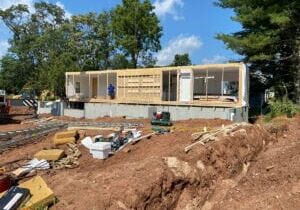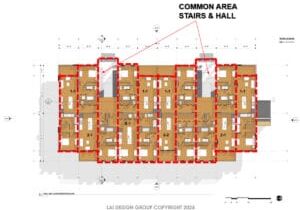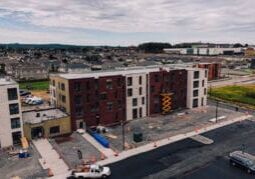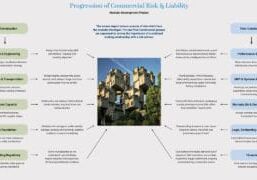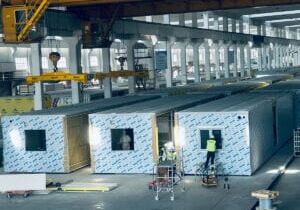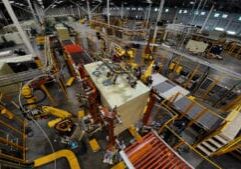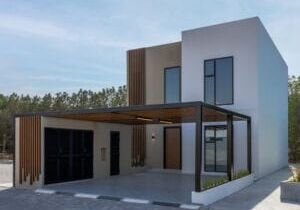Leading the Way with ICC/MBI Offsite Construction Standards: An Interview with Brian Hilderbrand of the Virginia Department of Housing and Community Development
As the demand for housing and infrastructure continues to outpace traditional construction methods, Virginia has taken proactive steps to modernize its building processes by embracing modular construction. One of the most significant milestones in this effort was the state's early adoption of the ICC/MBI Offsite Construction Standards—a move that has positioned Virginia as a national leader in the offsite construction sector.
A Strategic Move Toward National Consistency
Virginia's decision to adopt the ICC/MBI offsite building standards stemmed from a desire to address two of the most pressing challenges in the building industry: housing affordability and production capacity. Offsite construction, particularly modular methods, offers a scalable solution to both. However, the fragmented regulatory landscape across states has long created roadblocks for manufacturers and builders.
"Virginia, like the rest of the nation, is always looking for ways to address the challenges of producing enough housing to keep up with demand and making housing more affordable," said Brian Hilderbrand, Construction Regulation Administrator at the State Building Codes Office in the Virginia Department of Housing and Community Development.
“Offsite construction plays a critical role in addressing these challenges, but navigating the patchwork of regulatory requirements related to offsite construction across the country has long been identified as a major barrier for the offsite construction industry. Implementation of a national standard for the approval of offsite construction is an important step in addressing this barrier.”
By adopting a nationally recognized standard, Virginia helped eliminate this inconsistency. The state played a key role in developing the standards and became one of the first to implement them.
“The standards have improved our program by formalizing many of the policies and practices we had in place and ensuring that the requirements are clear and consistent. Our industry customers regularly express their appreciation for Virginia’s offsite program and for our willingness to be a leader in addressing the barriers they face.”
continued below...
ICC/MBI Standards for Off-Site Construction
Published in partnership with the ICC, these off-site standards bring clarity to the off-site and modular construction processes.
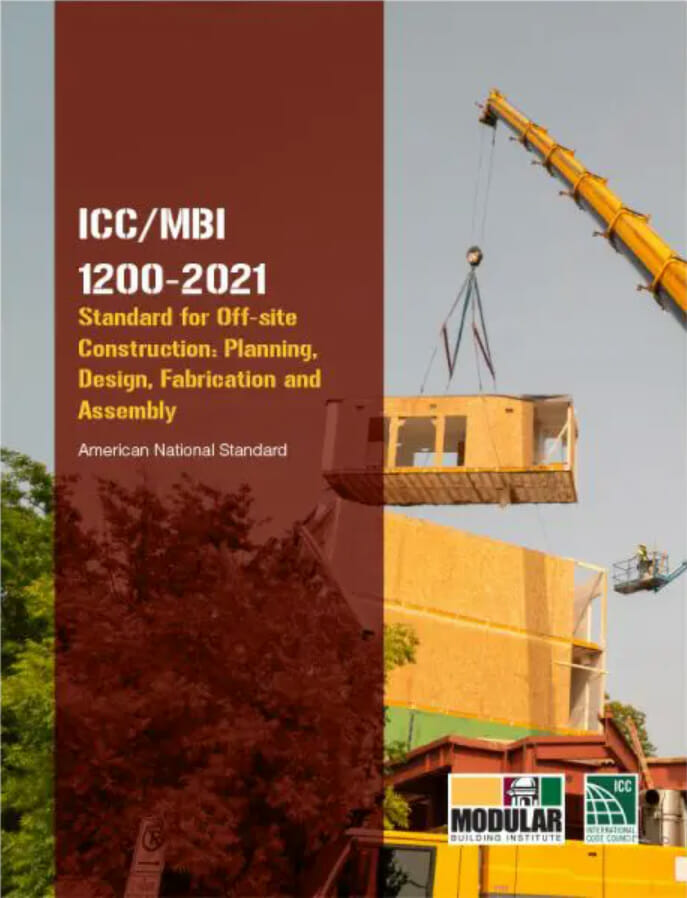
ICC/MBI 1200-2021 Standard for Off-site Construction: Planning, Design, Fabrication and Assembly
This first edition standard provides planning and preparation requirements such as: the role of the architect, modular manufacturer, construction manager, and general contractor; location of plant vs. construction site; and material procurement and lead times.
ICC/MBI 1200-2021 includes requirements for:
- A controlled manufacturing environment.
- Supply chain integration.
- Structural modular vs. nonstructural modular.
- The fabrication process and on-site assembly.
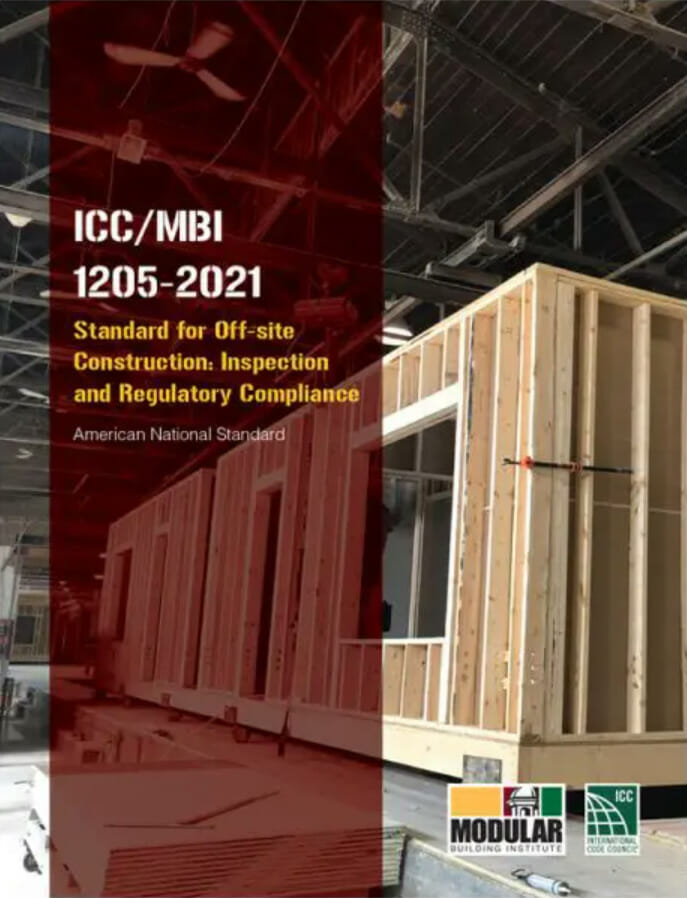
ICC/MBI 1205-2021 Standard for Off-site Construction: Inspection and Regulatory Compliance
The scope of this first edition standard is to provide minimum requirements to safeguard the public health, safety and general welfare and address societal and industry challenges for the inspection and regulatory compliance of off-site and modular construction. It addresses the inspection, approval and regulatory compliance of off-site residential and commercial construction components as well as their assembly and completion at the final building site.
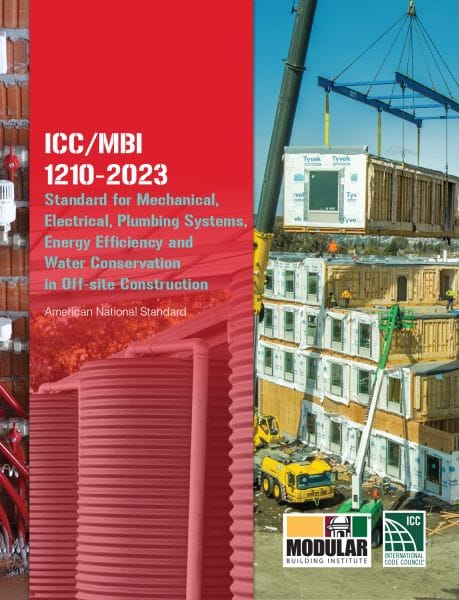
ICC/MBI 1210-2023 Standard for Mechanical, Electrical, Plumbing Systems, Energy Efficiency and Water Conservation in Off-site Construction
The scope of this standard is to provide minimum requirements to safeguard the public health, safety, general welfare and address societal and industry challenges for the energy efficiency and water conservation of off-site construction projects and the planning, designing, fabricating, transporting, and assembling, of commercial and residential building mechanical, electrical and plumbing (MEP) system elements. This includes the componentization and modularization of elements of MEP systems, the incorporation of MEP systems in componentized, panelized or modularized building elements, and the achievement of energy efficiency and water conservation requirements in off-site construction.
Rapid Growth of Commercial Modular Construction Since 2019
Virginia has witnessed a surge in commercial modular construction projects over the past several years.
"By a significant margin," said Hilderbrand, "utility type accessory structures have increased the most. This would include control rooms for substations and cell towers, gensets, switchgear enclosures, etc., followed by guard shacks and construction trailers. There has also been a significant increase in educational buildings for both schools and private companies."
A growing trend has also emerged around modular bathroom pods. In fact, one Virginia-based manufacturer recently produced 314 pods for a hotel in the southwest region of the state, with another producer preparing to deliver a similar quantity for a hotel project in Central Virginia.
"I believe the primary reason for the sustained growth is the increase in awareness of the availability and versatility of these structures at a considerably more affordable cost," commented Hilderbrand. "Registered design professionals are seeing the advantages to incorporating these structures into their designs, saving their customers time and money while increasing quality.
"Based on conversations with local building departments, contractors and other stakeholders, we anticipate significant increases for the foreseeable future in not only the utility occupancies but in R-2, A-3, and E occupancies as well."
Driving Factors Behind Continued Growth
The sustained expansion of modular construction in Virginia can be attributed to increasing awareness of the benefits these structures offer. Cost efficiency, time savings, and improved quality control have made modular systems a preferred option for many design professionals. Architects and engineers are now more inclined to integrate modular components into their plans, which has translated to greater adoption across sectors.
In Hilderbrand's opinion, "the most impactful [reason modular construction is growing in Virginia] is plan review."
"In Virginia," he said, "the CAA’s review the drawings in accordance with the Virginia Uniform Statewide Building Code, comment on non-compliances, and approve compliant drawings, evidenced by their seal on each page. The CAA is then required to submit 20% of all Virginia Plans they approve each month (minimum of 1) to the SBCO for a cursory review. This eliminates a common bottleneck caused by the state reviewing and approving the drawings causing significant delays, which discourages the use of modular units."
Even during the challenges posed by the COVID-19 pandemic, the upward trajectory continued—a testament to the resilience and appeal of modular construction.
Promoting a Modular-Friendly Environment
Another vital initiative has been education. Many local officials initially lacked a clear understanding of modular construction and its rigorous quality assurance processes. Confusion between manufactured homes and industrialized modular buildings further complicated acceptance.
"So many of the local officials do not have a clear understanding of modular and the multiple layers of quality assurance checks required before seals are affixed," said Hilderbrand. "There are some that still do not understand the difference between Manufactured Homes and Industrialized Buildings. Here in Virginia, we provide an 8-hour class in localities throughout the state every year on offsite construction. Through these efforts, we have seen a significant increase in awareness leading to considerably greater acceptance and even appreciation of modular buildings."
Virginia’s embrace of modular construction and its adoption of the ICC/MBI standards serve as a compelling example of how states can modernize their building codes, support industry innovation, and meet urgent construction needs. Through strategic planning, regulatory clarity, and public education, the Commonwealth is not just responding to today's challenges—it's building for the future.
About the Author: John McMullen, PCM, is the marketing director for the Modular Building Institute. You can reach him directly at mcmullen@modular.org or on LinkedIn.
More From Modular Advantage
AoRa Development Aims for New York’s First Triple Net Zero Building Using Modular Methods
More cities are providing funding for newer infrastructure projects as long as they meet sustainability requirements. This is how modular can fit the bill, thanks to its lower waste production.
Developers and Designers: Lessons Learned with Modular Design
Modular construction is attractive to many developers because sitework and module construction can occur simultaneously, shortening the schedule and reducing additional costs.
UTILE: Putting Modular Building on a Fast Track
In Quebec, UTILE is taking the lead in creating affordable modular buildings to help decrease the student housing shortage. During the process, the company discovered what it takes to make the transition to modular building a success.
Sobha Modular Teaches Developers How to Think Like Manufacturers
With its 2.7 million square foot factory in UAE, Sobha Modular is bringing both its high-end bathroom pods to high-end residences to Dubai while developing modular projects for the U.S. and Australia.
RoadMasters: Why Early Transport Planning is Make-or-Break in Modular Construction
In modular construction, transportation is often called the “missing link.” While it rarely stops a project outright, poor planning can trigger costly delays, rerouting, and budget overruns.
Navigating Risk in Commercial Real Estate and Modular Construction: Insights from a 44-Year Industry Veteran
Modular projects involve manufacturing, transportation, and on-site assembly. Developers must understand exactly what they are responsible for versus what they subcontract. Risk advisors should research the developer’s contractors, subcontractors, and design-build consultants—especially the modular manufacturer.
Art²Park – A Creative Application of Modular and Conventional Construction
Art²Park is more than a park building—it’s a demonstration of what modular construction can achieve when thoughtfully integrated with traditional materials. The use of shipping containers provided not only speed and sustainability benefits but also a powerful structural core that simplified and strengthened the rest of the building.
Building Smarter: A New Standard in Modular Construction Efficiency
Rising material prices, labour shortages, expensive financing and tightening environmental rules have made conventional construction slower, costlier, and more unpredictable. To keep projects on schedule and within budget, builders are increasingly turning to smarter industrialized methods.
Resia: Breaking All the Rules
Resia Manufacturing, a division of U.S.-based Resia, is now offering prefabricated bathroom and kitchen components to industry partners. Its hybrid fabrication facility produces more precise bathroom and kitchen components (modules) faster and at lower cost than traditional construction. Here’s how Resia Manufacturing does it.
How LINQ Modular Innovates to Bring Modular To The Market in the UAE and Beyond
LINQ Modular, with an office and three manufacturing facilities in Dubai, is a modular firm based in United Arab Emirates. The company is on a mission: to break open the housing and construction markets in the Gulf Cooperation Council (GCC) area with modular.

